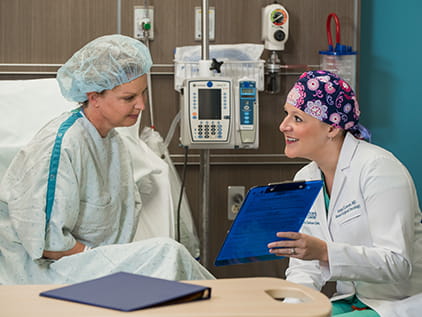Breast Cancer
Breast Cancer Questions to Ask
Receiving a breast cancer diagnosis can be overwhelming, and you are bound to have numerous questions to ask a breast surgical oncologist about breast cancer treatment. But remember, there’s always time to get a second opinion. It’s critically important to confirm that your diagnosis is correct before treatment begins. When considering where to receive treatment, ask the provider the following breast cancer questions.
Questions to ask about breast cancer

Your best option for beating cancer
The Women’s Cancer Center at The University of Kansas Cancer Center focuses on breast and gynecologic cancers, providing specialized care to women.
Your first choice for a second opinion.
Having confidence in your diagnosis and treatment is critical when you're faced with the possibility of cancer. Call 913-588-1227 for a second opinion.